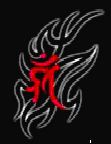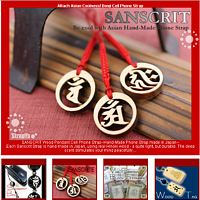
The image on the left was sent in by Terence from Singapore who thought it was Siddhaṃ but was unsure what letter or word it was. It is being used in a Japanese Movie called "
Aragami - raging god of battle" which seems a bit of an unfortunate association but such is life.

The character in red seems to quite clearly be khaṃ - based on kha (
right). I'm not sure but I suspect that the white represents a styalized kanji or Chinese character (let me know if you recognise it). In my reply to Terence's email I explained the traditional associations with this syllable
khaṃ:
Khaṃ is what is known as a seed syllable, it is a kind of mantra. There is a Sanskrit word kha which does just mean space. Sanskrit is an inflected language which means that the word ending changes depending on the case of the noun. The ending 'ṃ' is probably a nominative. So it just means space.
However you need to take into account that mantras are esoteric sounds and what the word means in a dictionary may have nothing to do with how it functions as a mantra. Many mantras do not make sense in the ordinary way we use that word. Mantras are sound symbols of something which transcends words. It is common to see khaṃ in the context of discussions of the elements (earth, water, fire, wind, space) - in the Upaniṣads, or the early Buddhist tantras for instance - where it is always associated with the element space. Khaṃ as a mantra, and space itself as a symbol, stand for, amongst other things, the emptiness and vastness of consciousness in it's primordial state. It is effectively equivalent to śunyata.
We could further note that the syllable kha occurs in the mantra of
MahavairocanaLabels: Japan, Queries, Siddham
 In modern Japan we see examples of Bonji in all sorts of odd settings. The screen shot on the left is from strapya-world which sells, amongst other things, cell-phone decorations. The 'strap line' says:
In modern Japan we see examples of Bonji in all sorts of odd settings. The screen shot on the left is from strapya-world which sells, amongst other things, cell-phone decorations. The 'strap line' says:




